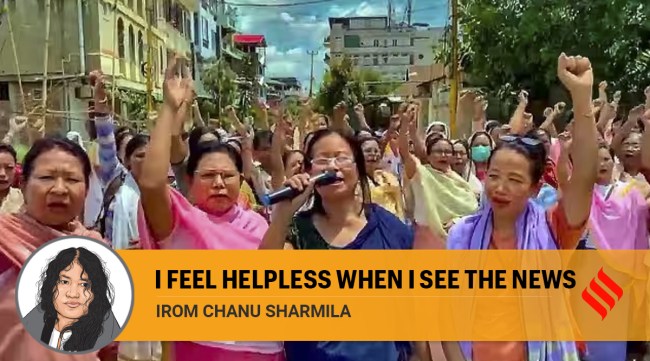Opinion Irom Sharmila speaks: I cried, I feel helpless… the attitude in Manipur is women are the state’s property
With their act of humiliating others and sexual assault, what were the perpetrators trying to achieve?
 Women raise slogans during a protest after a May 4 video surfaced on Wednesday showing two women from one of the warring communities being paraded naked by a few men in violence-hit Manipur. (PTI Photo)
Women raise slogans during a protest after a May 4 video surfaced on Wednesday showing two women from one of the warring communities being paraded naked by a few men in violence-hit Manipur. (PTI Photo) When I saw the video of the public, brutal and utterly shameful assault on two women in Manipur, I broke down. Nothing can excuse or justify the sheer inhumanity of what took place. The incident also brings to the fore some deeper issues.
In Manipur, women have had an important symbolic role in public life and protests – whether it is the Imas of Ima Keithel (the women’s market) or Meira Paibis or even the women who led the Nupi Lal (Women’s War) against the British. However, the lived reality on the ground is different, and women in the state are subject to deep oppression.
I can speak from my own experience. In my 16-year long hunger strike, when I did not even drink water, I was reduced to a symbol. Despite my struggles, I felt that people would view me as “just a woman’’. I felt like the state’s (Manipur’s) property. That is the kind of attitude people have towards women.
With regards to my struggle, the only concern seemed to be whether the Armed Forces Special Powers Act be repealed or not. In a conflict situation, women are always targeted – I know this from my own experience. And only a woman can understand the suffering of another woman.
Since the violence began three months ago, I have been following the news from Manipur in Bengaluru, where I now live. I was not surprised when I first heard of the conflict. Manipur is a multi-ethnic, multi-cultural society. The differences between the various communities in the state have been deep and have existed for a very long time.
I spoke to a Meitei friend in Manipur and received one account of what is happening. Then I spoke to a Kuki friend in Bengaluru and got a completely different account. They both held polar opposite views. I feel that one of the reasons we have come to this point is the sheer neglect by the Centre, not just now, but for decades, of the Northeast in general, and Manipur in particular.
Successive governments have ignored the state and have never really tried to resolve the conflict in Manipur or between the communities. The accusation about the Kukis encroaching on the land and there being a large number of illegal immigrants from Myanmar is problematic. The immigrants are refugees and they came to Manipur because they were fleeing oppression and violence in their own country. We need to look at the issue far more sensitively — the immigrants need to be treated humanely. The central and state governments should have dealt with the immigrant issue much better.
The entire issue actually seems to revolve around land. But people need to realise that when they die, they are not going to take their piece of land with them. The central government also needs to deal with the people of Manipur with parental affection — like they are a part of their family — and consult every community while taking decisions. This is where both the state government and the central government have failed – it shows a lack of leadership. The state government should have consulted the leaders of the Kuki community, instead of just imposing their decisions on them.
My struggle against AFSPA was for all the people of Manipur, all the communities in the state – Kukis, Nagas and Meiteis. It wasn’t just for the Meiteis. After 2004, when Prime Minister Manmohan Singh removed AFSPA from Imphal city, the Chief Minister at the time Okram Ibobi Singh had come to meet me at JNIMS hospital where I was kept as a prisoner, and requested me to call off my hunger strike. Others, including senior nurses, also put pressure on me to give up my struggle. But I told them at the time — what about the hills and the tribal people? They will not receive the benefit of AFSPA having been removed. I told them I will continue my struggle till the time AFSPA is removed from the entire state.
I feel helpless when I see the news now. With their act of humiliating others and sexual assault, what were the perpetrators trying to achieve?
(As told to Esha Roy)
Sharmila is an activist who was on a 16-year hunger strike demanding the repeal of the Armed Forces Special Powers Act





